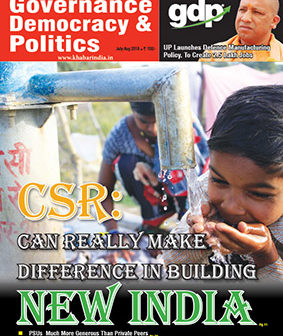India is a country of scarcity and with more than 1.3 billion people living in the subcontinent, any amount budgeted by the government for the welfare of the people seems miniscule by any given global standard. Though the government plans various schemes for the uplift of the poor and the needy, when it comes to real spending on these schemes, the government finds it difficult to satisfy all the people concerned. Be it education or healthcare or any other human development index-centric sector that calls for focused government intervention and huge financial support to change the standard of living of the people of the country, whatever the government earmarks, becomes peanuts when compared with the mammoth need of a country like India. It may be mentioned here that the government has earmarked Rs. 85,010 crore for education (3.48%) and Rs 54,667 crore (2.1%) for health sector in the FY 2018-19 Budget, but the state of Indian education and health care sector is known to everybody. It is not just money and finances that can improve upon the human development index (HDI), where India is placed at 131th spot among 188 countries, but a focused approach, not only by the government but also by all the stakeholders, is necessary.
Perhaps it is this “sense of responsibility” that defines the “stakeholders” in any set-up and in our opinion, this is the very foundation of Corporate Social Responsibility or CSR, as known today in corporate jargon. Though the concept of CSR is quite old in India as our religious beliefs since ages has preached about “giving back” to the society whatever a person takes from it. In fact, great Indian corporate like Tata, Birla, etc. have always remained focused on this concept of “giving back” to society and have often named it as charity, aid, assistance etc. Even public sector undertakings (PSUs), which are regarded as temples of modern India, had their initiation into the concept of Sustainability, Growth and Compassion. Even if this concept of compassion was there since ages, the term CSR becomes much more important in the present context as far as India Inc. is concerned, as the Companies Act, 2013 has made corporate social responsibility compulsory for every company, be it private, public, listed or unlisted.
This being the reason, the Governance, Democracy & Politics (GDP) Magazine has decided to come out with a state-of-the-art Second Annual Issue on CSR which delves into this crucial subject to find out how India Inc. looks towards this “mandatory obligation.” Aware of it, the GDP has taken the initiative in depicting the ground zero situation, going through the psyche of organisations, public perception, and most importantly, the mode of implementation being used by the companies. What is more encouraging is that fact that 19,184 companies spent a whooping Rs 13,828 crore on CSR during FY16, a jump of Rs 4,263 crore over FY15 level, — surely, a giant “first leap” of India Inc. by any standard.
Format of the Second Annual Issue on CSR
As far as the format of this Second Special Issue on CSR is concerned, it will include various public sector companies, MNCs, private corporate, etc. that work in cohesion in building a robust and sustainable society to create a strong and prosperous country. This Special Issue will display and collate interesting facts and database of money spent by India Inc. on CSR along with the efforts of these organisations to make the country and society a better place to live in.
It will have a regressive database of CSR Expenditure of 6,000+ corporate, including PSUs, private sector and MNCs, and will highlight various initiatives of the Public Sector Undertakings (PSUs), MNCs and private companies in the fields of Corporate Social Responsibility, energy conservation, power, health, education, sustainable development, etc. Also, it will highlight the vision of management in the fields of sustainable development and responsibility to make India a better place to live. In making this endeavour a success, we are thankful to the Ministry of Corporate Affairs, whose officials are always ready to provide information regarding CSR to the outside world and put it in public domain.
Though this issue would be available on stands, if you find any difficulty in getting the copy you can order your copy of this state-of-the art issue by either calling or mailing on the following:
Email: gdpindia.net@gmail.com
Phone: 9540335555





